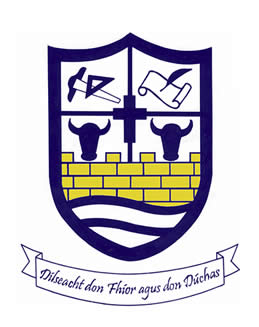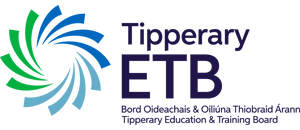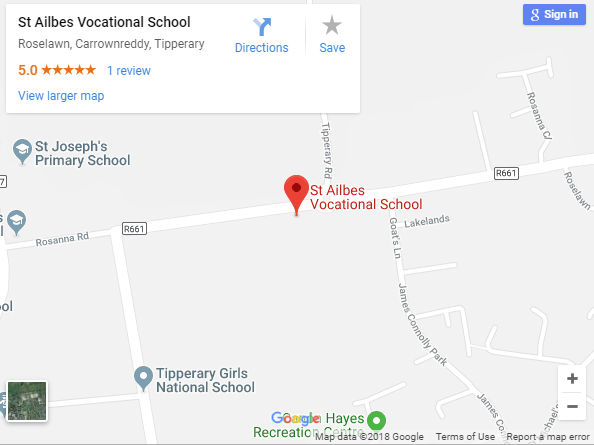Home/School Liaison
St. Ailbe’s School has a full-time Home School Community Liaison Officer. The aims of the Home/School Liaison are:
- To promote active cooperation between home, school and relevant community
- To maximise active participation of the student in the learning process, particularly those who might be at risk of not completing education or completing it to the best of their ability.
- To raise awareness of parents in their own capacities to enhance their children’s educational progress and assist them in developing relevant skills.
- To enhance the student’s uptake from education, their retention in the educational system, their continuation to post-compulsory (>16yrs/Junior Certificate) and to third level and their attitudes to life-long learning.
- To disseminate the positive outcomes of the scheme throughout the school system generally.
Principles of the Scheme
- The scheme consists of a partnership and collaboration of the complementary skills of parents and teachers.
- The scheme is unified and integrated at both primary and second level.
- The thrust of the scheme is preventative rather than curative.
- The focus of the scheme is on the adults whose attitudes and behaviours impinge on the lives of children, namely, parents and teachers.
- The basis of activities in the scheme is the identification of needs and having those needs met.
- The scheme develops teacher and staff attitudes in the areas of partnership and the whole school approach.
- The scheme promotes the fostering of self-help and independence.
- Home visitation is a crucial element in establishing bonds of trust with families.
- Networking with and promoting the coordination of the work of voluntary and statutory agencies increases effectiveness, obviates duplication and leads to an integrated delivery of service to marginalised children and their families.
- Home School Community Liaison is a full-time undertaking.
- The liaison coordinator is an agent of change.
- Community ‘ownership’ of the scheme is promoted through the development of the Local Committee.
Student Services:
A fee of €150.00 per student is requested to cover the following costs.
- School Locker and lock.
- Rental Scheme for Textbooks.
- Postage of circulars and examination results etc. to parents.
- Photocopying.
- School Accident Insurance Scheme. (24 hour cover).
- Project materials for practical subjects, MTW, Art Craft & Design, H.E., MTM, etc.
If there is more than one family member attending St. Ailbe’s the above will be reduced pro rata.
Personal Accident Insurance Scheme:
There is an Accident Insurance Scheme for pupils; Pupils will have full 24 hour cover for the full year and it will avoid hefty bills where accidental injury occurs.
Evening Study
Supervised study will be organised at the school time
Mondays and Wednesdays 4.00 – 5.50 p.m.
Tuesdays and Thursdays 3:40-5:30p.m.
Term 1 – to commence on the second week of September – €100.00 per term or €7 per week.
Term 2 – to commence on the first day of the new term.
Used properly Evening Study can be a great asset for the student. It will take place four evenings per week Monday to Thursday.
Students participating in Evening Study can also avail of a subsidised evening snack.
Evening Snack:
This light snack is available free of charge to students participating in our Evening Study and Homework Club Programme.
At St. Ailbe’s in 2023/2024, we aim to introduce the use of restorative circles in our classroom and for teachers to use restorative questions when solving conflict.
What is restorative practice?
Restorative practice is based primarily on a set of core values and the explicit promotion and enhancement of particular skills such as the ability to empathise and to find solutions to specific problems. This practice allows for building trust between and with people. It provides a structured approach in the form of a scaffold, which helps build and sustain relationships, and provides a focus which allows for the potential growth of positive relationships to become established between people. The development of each relationship is based on a set of core values. These values include respect, and being respectful of everyone, including towards people someone maybe doesn’t always see eye to eye with or even like.
Through the development of empathy, and promoting understanding of perspective taking, people can learn to respect each other and where someone is coming from in terms of their own expression of thought and feelings. In our efforts to show empathy, as human beings we are able to harness the notion of fairness into our relationships, and therefore can also account for our own actions and hold others to account for theirs.
Restorative [Practice programmes] in schools aim to develop:
• communities that value the building of quality relationships coupled with clear expectations and limits
• restorative skills in the way we interact with young people – using teachable moments to enhance learning
• restorative processes that resolve conflict and repair damaged relationships
• communities that are forward looking, optimistic, and inclusive.
(Harrison, 2007, pg. 17)
Restorative Practice Questions:
What happened?
What were you thinking of at the time?
What have you thought about it since?
Who has been affected and in what way?
How could things have been done differently?
What do you think needs to happen next?
Please click on the link below to understand how the restorative practice questions are used:
Please click on the link below to watch a restorative circles: Restorative Problem Solving Circle in School


